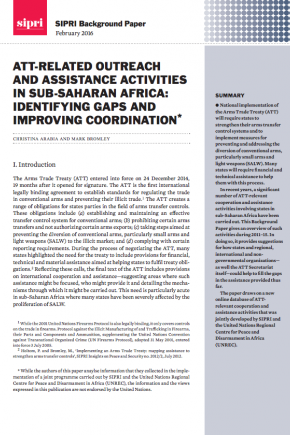ATT-related Outreach Assistance in Sub-Saharan Africa: Identifying Gaps and Improving Coordination
National implementation of the Arms Trade Treaty (ATT) will require states to strengthen their arms transfer control systems and to implement measures for preventing and addressing the diversion of conventional arms, particularly small arms and light weapons (SALW). Many states will require financial and technical assistance to help them with this process. This need is particularly acute in sub-Saharan Africa where many states have been severely affected by the illicit trade in, and proliferation of, SALW.
In recent years, a significant number of ATT-relevant cooperation and assistance activities involving states in sub-Saharan Africa have been carried out. These activities have been aimed at improving states’ arms transfer controls or helping them to take other measures to prevent the diversion of SALW. While some of these activities have been explicitly directed at ATT implementation, the majority have been focused on implementing other regional and international standards related to arms transfer and SALW controls.
This Background Paper gives an overview of the ATT-relevant cooperation and assistance activities involving states in sub-Saharan Africa during 2011–15. In doing so, it provides suggestions for how states and regional, international and non-governmental organizations—as well the ATT Secretariat itself—could help to fill the gaps in the assistance provided thus far.
The paper draws on a new online database of ATT-relevant cooperation and assistance activities that was jointly developed by SIPRI and the United Nations Regional Centre for Peace and Disarmament in Africa (UNREC).
The authors gratefully acknowledge the British Foreign and Commonwealth Office for generously funding the production of this SIPRI Background Paper.
While the authors of this paper anaylse information that they collected in the implementation of a joint programme carried out by SIPRI and the United Nations Regional Centre for Peace and Disarmament in Africa (UNREC), the information and the views expressed in this publication are not endorsed by the United Nations.


